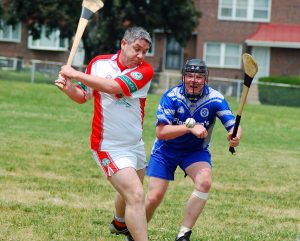by Sophie Isbister (Contributor)
 Hurling, contrary to what the name might imply, is not a game of championship vomiting after competitive drinking; it’s the traditional Gaelic sport in which you compete before consuming several dozen pints.
Hurling, contrary to what the name might imply, is not a game of championship vomiting after competitive drinking; it’s the traditional Gaelic sport in which you compete before consuming several dozen pints.
Hurling is said to predate Christianity. The field stick-and-ball sport, which was brought to Ireland by the Celts over 2000 years ago, may seem like a strange candidate for this column, having been well established for so long in Ireland and other parts of Western Europe. But did you know you can watch a hurling match right here on the West Coast?
Hurling is known as “the fastest game on grass” and combines skills from hockey, lacrosse and baseball. Due to the speed of the game and the intense athleticism required, hurling is quickly gaining popularity across North America, so much that it was even featured in an episode of CSI: New York. Gaelic Athletic Associations have been in North America since 1888, but hurling was frequented mostly by Irish immigrants.
The sport took decades to be recognized and adopted by Americans, but now there are over 100 clubs in the North American GAA and 12 clubs in Canada. The largest hurling club in North America is populated mostly by Americans. In 2008, the Vancouver Harps Hurling Club was formed, and they have been competing in matches in Seattle and Western Canada for the last three hurling seasons. Hurling has also broken into the campus sports arena, most notably in California. In 2009, the California Collegiate Gaelic Athletic Association formed and hosted the first ever University hurling match between college teams from Stanford and UC Berkeley.
The sport is a fast and unpredictable game. It’s played with a stick, called a hurley, which is about 80-100 centimeters long, with a flattened end a little shorter than a hockey stick’s end. The ball used is about the size of a baseball and is called a sliotar. It weighs about 110 grams, lighter than a baseball, and is filled with cork and flies extremely far when hit. Players can hit the ball with their hand or the hurley and can also carry the ball for three steps, but they can’t throw the ball to another player, they must slap it either with their hand or the hurley. Passes can be either short or long, and goals are scored by either hitting the sliotar over the crossbar (called a point) or into the net (called a goal and worth three points).
The game can be brutally violent. With fifteen players per team, that’s 30 hurlers on the pitch at a time, and that means a lot of sticks waving around. Many hurlers will do anything to get to the sliotar and make or break a goal, but there are rules against full body checks. Only shoulder checking is allowed, and that’s a good thing, because hurlers don’t traditionally wear any protective gear other than shin pads and gloves. Though, as of January 2010, players are now also required to wear a light helmet with a face-mask.
The sport is best known for its camaraderie and sportsmanship. Players often hang about on the pitch after the game to talk to one another, and hurling and pub culture definitely go hand in hand. Hurling is also a sport played mostly by amateurs. Even players on popular teams in Ireland still maintain a day job. You don’t see any of the pro-sports posturing and million dollar deals of popular North American sports. That seems to be the allure of hurling, though. It’s a down to earth game that is completely focused on athleticism, competition and good showmanship. With its lightning speed pace, daring moves and strong team mentality, hurling is taking off in the west; maybe it’s time we took on hurling at UFV.


